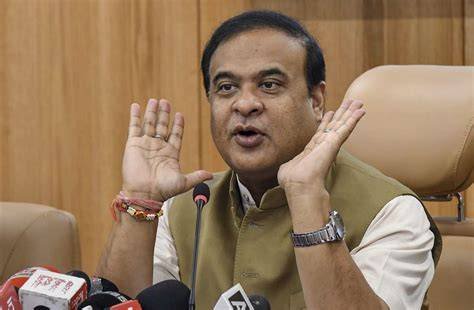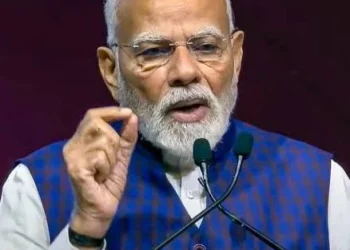Critics warn Assam’s move to arm “indigenous residents” could spark an arms race, while neighbouring Manipur struggles to recover thousands of stolen weapons from two years of ethnic violence.
BY Navin Upadhyay
August 2025 — Assam Chief Minister Himanta Biswa Sarma’s plan to allow “indigenous residents” in designated “sensitive areas” to obtain licensed firearms is snowballing into one of the state’s most polarising policy debates in recent years. Critics say the move not only risks fuelling an arms race and undermining state security forces, but also exposes a stark contradiction in how the BJP governs two neighbouring states.
While in Manipur, the same party’s administration has gone all out to persuade both civilians and insurgents to surrender arms — even offering amnesty in the past — Assam is taking the opposite route. By arming select communities in districts with a history of ethnic tension, opponents allege, the state is stoking fears against Bengali-speaking Muslims ahead of the Assembly polls.
The proposal, approved by the Assam Cabinet on May 28, will cover districts such as Dhubri, Morigaon, Barpeta, Nagaon, and South Salmara-Mankachar, as well as localities including Rupahi, Dhing, and Jania. These are areas with complex demographic mixes, many minority-dominated, and a history of ethnic violence. Sarma has defended the move as a protective measure for “indigenous Assamese” living in border and communally sensitive regions, claiming the demand dates back to the Assam Agitation of 1979–1985.
READ: Alt News Fact Check: Manipur’s Kukis Are Not Myanmar Refugees
Licences, he insists, will only be granted after “thorough scrutiny and a multi-layered process.” Yet the reassurance has done little to allay fears among rights groups, political opponents, and minority leaders.
Manipur’s cautionary tale: Two years of unrest amid rampant gun proliferation
In neighbouring Manipur, the dangers of widespread civilian access to firearms are still playing out. Since May 2023, the state has been gripped by relentless ethnic clashes between Meitei and Kuki-Zo communities, with the ready availability of looted and unlicensed arms turning skirmishes into protracted battles.
Nearly 8,000 weapons and lakhs of rounds of ammunition were looted from police armouries in the early days of the conflict, many of which remain unaccounted for despite repeated recovery drives. The weapons and ammunitions are alleged to have been allowed to be plundered by the people in power with the same objective which the Assam CM may be pursuing—to arm a section of people against another group.
Result: The easy flow of weapons has made ceasefire efforts fragile, as any can rapidly escalate into gunfire. Even today, house-to-house searches by security forces continue, with the government appealing for voluntary surrender to stem the violence. Peace activists warn that without complete disarmament, reconciliation between communities will remain elusive.
I strongly condemn Chief Minister Himanta Biswa Sarma’s decision to distribute arms to civilians in border regions of the state.
People of Assam deserve jobs, affordable healthcare, quality education, not guns.
Instead of strengthening police and border forces, the government…
— Gaurav Gogoi (@GauravGogoiAsm) May 29, 2025
For many in Manipur, the lesson is clear: once guns proliferate among civilians, pulling them back from the streets becomes a near-impossible task, with the social fabric left in tatters for years.
Women’s groups warn of “civil war scenario”
In Guwahati on Saturday, the Nari Nagarik Manch, an apolitical women’s collective, urged the government to withdraw the plan and instead strengthen police and paramilitary forces. “This decision will propagate gun culture in Assam, increase the risk of civil conflict, and heighten gender-based violence,” the group warned.
They argued that years of peace-building — including arms surrender drives after decades of militancy — would be undone by what they called a “lenient” licensing regime. The collective announced plans to submit a memorandum to the President, Prime Minister, Governor, and Chief Minister, file a Public Interest Litigation, and launch a social media campaign against the move.
Political backlash and communal fault lines
The Assam Pradesh Congress Committee (APCC) has questioned why the government is outsourcing security to civilians rather than strengthening the police. “Why can’t the government empower security forces instead of distributing arms to civilians?” asked APCC leader Gaurav Gogoi.
The #AssamCabinet has today taken a very important decision to protect the interests of our Jati, Mati, Bheti.
Arms Licenses will be granted to Original Inhabitants and indigenous Indian people living in vulnerable areas to tackle unlawful threats from hostile quarters. pic.twitter.com/a29M67uekV
— Himanta Biswa Sarma (@himantabiswa) May 28, 2025
Leader of the Opposition Debabrata Saikia called the plan “unconstitutional and dangerous to Assam’s fragile peace.” Senior Congress leader Bhupen Borah compared it to “normalising a culture of guns, like in the United States.”
From outside the Congress, Akhil Gogoi of the Raijor Dal described the policy as “politically charged” and aimed at creating fear among minorities. The CPI, Asom Jatiya Parishad, and civic groups like the Nagaon Nagarik Sabha warned of weapon misuse and deepening social divides.
READ: 300 Opposition MPs to March Against Alleged Poll Rigging
Security experts warn that arming one community in communally sensitive districts could trigger an unintended arms race, with rival groups seeking weapons for their own protection. Assam’s history — from the 1983 Nellie massacre to the 2012 Kokrajhar riots — is a reminder of how quickly tensions can spiral when weapons are readily available.
Some analysts fear civilian gun ownership could erode trust in formal law enforcement, fostering parallel “community defence” systems that operate outside the law. Others see political risks: accusations of selective protection could deepen identity-based polarisation ahead of the polls.
For now, Assam stands at a crossroads. In one state, the BJP is urging people to lay down their guns. In another, it is putting guns into people’s hands. Whether this divergence is about local realities or political calculus, the stakes — in terms of peace, security, and communal harmony — could not be higher.













